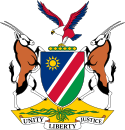Electoral system
The 18 members of the Legislative Assembly were elected from single-member constituencies: Aroab, Gobabis, Grootfontein, Keetmanshoop, Luderitz, Maltahöhe, Mariental, Okahandja, Otjikondo, Otjiwarongo, Outjo, Rehoboth, Swakopmund, Usakos, Warmbad, Windhoek East, Windhoek North and Windhoek West. [2]
This page is based on this
Wikipedia article Text is available under the
CC BY-SA 4.0 license; additional terms may apply.
Images, videos and audio are available under their respective licenses.
